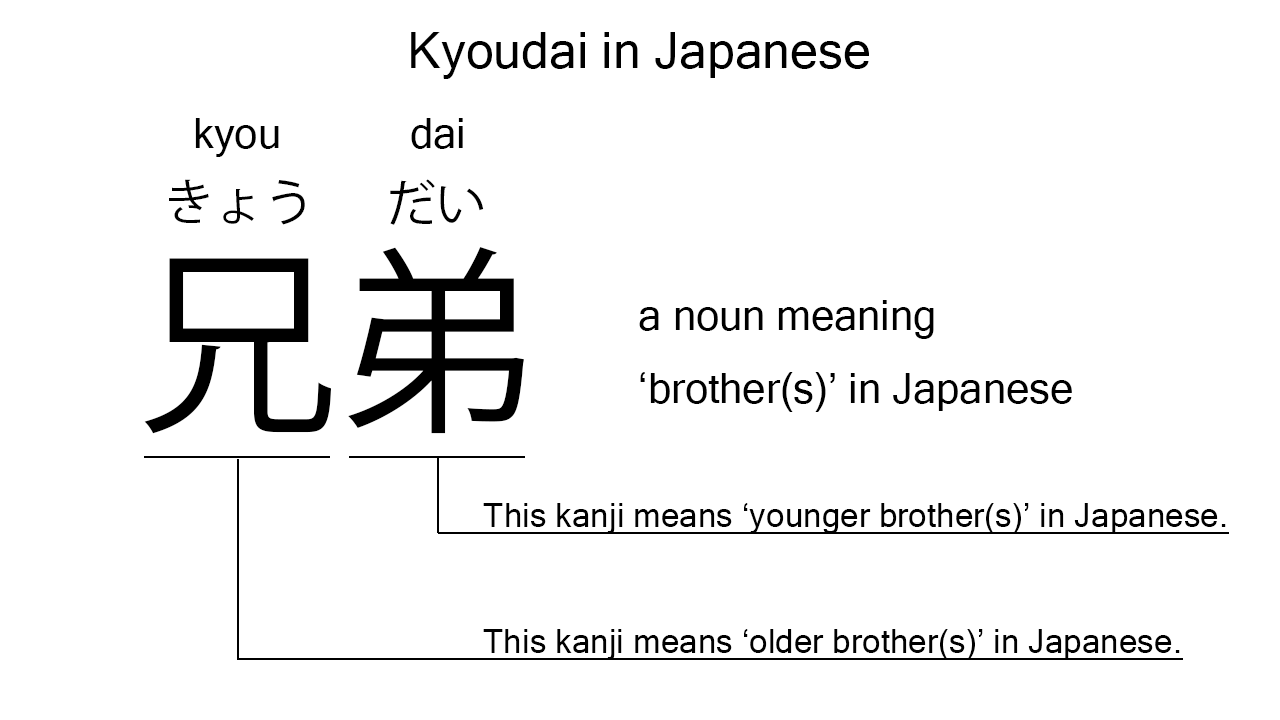What does “kyoudai” mean in Japanese?
Japanese native speakers say “kyoudai” to mean ‘brother’, ‘sister’, or ‘sibling’ in general. Perhaps, some Japanese learners know this word as it is sometimes used in Japanese conversations. In this blog post, however, I will explain this word in detail based on its kanji expression. In addition, I will explain how to use it through example sentences. My explanations would help Japanese learners understand “kyoudai” more clearly. Then, let’s get started!
Contents
Definition and meanings of “kyoudai”
Let me start with the definition and meanings of “kyoudai”.
- kyoudai – 兄弟 (きょうだい) : a noun meaning ‘brother’, ‘sister’, or ‘sibling’ in general. This can also work as plural. Learn more about Japanese plural.
Japanese native speakers use this noun to refer to not only brothers, but sisters as well. In addition, they often use this to refer to siblings in general.
The definition and meanings are simple and clear, I think. To understand this noun more clearly, however, let me explain its kanji characters in detail, one by one.
What does “kyoudai” literally mean in Japanese?
The kanji expression of “kyoudai” consists of the following two kanji characters:
- 兄 : a kanji character used to mean ‘older brother’ or ‘elder brother’ in Japanese. This can also be found in other words like “oniichan“.
- 弟 : a kanji character used to mean ‘younger brother’ or ‘little brother’ in Japanese.
These two kanji characters tell us that “kyoudai” literally means ‘older brothers and younger brothers’ in Japanese. This literal interpretation is not completely in line with the actual meanings, but still understandable, I think. This noun, anyway, refers to blood-related people who have the same parents.

When we meet new kanji expressions, we should check their kanji characters in detail to understand their meanings clearly and deeply. In many cases, kanji characters tell us a lot about the meanings of the expressions they form. Actually, here, we could get the better understanding of “kyoudai” through the detailed kanji check above.
So far, I’ve explained the definition and meanings of “kyoudai” together with its kanji characters. Then, let me explain how to use it through the example sentences below.
Example #1: how to say “brothers” in Japanese
watashi no kyoudai wa mada gakusei desu – 私の兄弟はまだ学生です (わたしのきょうだいはまだがくせいです)
My brothers are still students.
Below are the new words used in the example sentence.
- watashi – 私 (わたし) : a pronoun meaning ‘I’ in Japanese.
- no – の : a case particle used after a noun or pronoun to make its possessive case. In the example, this is used after “watashi” to make its possessive case, “watashi no“, which means ‘my’ in Japanese.
- wa – は : a binding particle working as a case marker or topic marker. In the example, this works after “watashi no kyoudai” to make the subject in the sentence.
- mada – まだ : an adverb meaning ‘still’ or such in Japanese.
- gakusei – 学生 (がくせい) : a noun meaning ‘student’ in Japanese. This can also work as plural.
- desu – です : an auxiliary verb used after a noun or adjective to make it polite. Probably, this is well known as a part of Japanese desu form. In the example, this is used after “gakusei” to make it sound polite.
This is a typical usage of “kyoudai”. In this example, it works as a part of the noun phrase, “watashi no kyoudai”, which means ‘my brothers’ in Japanese.
Example #2: another usage of “kyoudai”
ore no kyoudai wa tokyo ni iru – 俺の兄弟は東京に居る (おれのきょうだいはとうきょうにいる)
My brother is in Tokyo.
Below are the new words used in the example sentence.
- ore – 俺 (おれ) : a pronoun meaning ‘I’ in Japanese. In the example, this works together with “no” to mean ‘my’ in Japanese.
- tokyo – 東京 (とうきょう) : a noun meaning ‘Tokyo’ in Japanese.
- ni – に : a case particle used to say where someone or something is. In the example, this is used after “tokyo” to say where the speaker’s brother is.
- iru – 居る (いる) : a verb meaning ‘to be’ or sometimes ‘to live’ in Japanese.
This is another typical usage of “kyoudai”. In this example, it works as a singular to mean a ‘brother’ in Japanese. Again, but it can work as both a singular and a plural. Anyway, when we want to refer to blood-related people who have the same parents in Japanese, “kyoudai” is always a very good option.
Summary
In this blog post, I’ve explained the definition and meanings of “kyoudai” in detail based on its kanji expression. And also, I’ve explained how to use it through the example sentences. Let me summarize them as follows.
- kyoudai – 兄弟 (きょうだい) : a noun meaning ‘brother’, ‘sister’, or ‘sibling’ in general. This can also work as plural. These two kanji characters literally mean ‘older brothers and younger brothers’ in Japanese. This literal interpretation is not completely in line with the actual meanings, but still understandable, I think. This noun, anyway, refers to blood-related people who have the same parents.
Hope my explanations are understandable and helpful for Japanese learners.
Leave a Reply